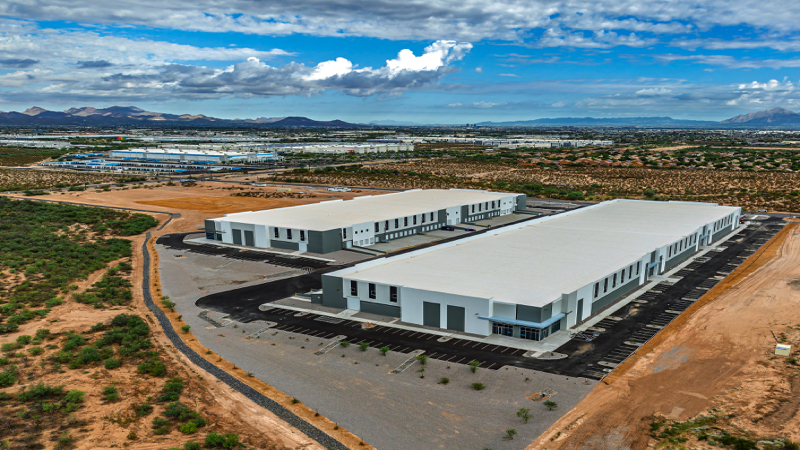
Lincoln Property Company Completes $80 Million Phase I of I-10 International Logistics Campus in Tucson
TL;DR
Lincoln Property Company's I-10 International offers prime industrial space in Tucson's strategic airport submarket, providing logistics advantages near major interstates and established corporate neighbors.
The $80 million Phase I development includes two warehouse buildings totaling 373,811 square feet with 32-foot clear heights, energy-efficient roofing, and flexible suite configurations for various tenant needs.
This project creates modern industrial spaces with employee-focused amenities and energy-efficient design, supporting Tucson's economic growth while providing quality work environments for the community.
I-10 International features creative industrial design with outdoor barbecue areas, shaded landscapes, and abundant natural light, setting new standards for industrial workspace comfort and appeal.
Lincoln Property Company has announced the completion of I-10 International Phase I, marking the company's first ground-up industrial development in Tucson, Arizona. The $80 million project represents a significant addition to Southern Arizona's emerging Sonoran Desert industrial corridor and addresses the region's limited pipeline of modern industrial space.
The completed phase sits on 79 acres at the southeast corner of Alvernon Way and Los Reales Road, strategically positioned just two miles from a full-diamond interchange at I-10 and Valencia Road within the Tucson International Airport submarket. The initial development totals 373,811 square feet across two high-performing warehouse and distribution buildings: Building B at 158,944 square feet and Building C at 214,867 square feet. Future phases include a fully designed 188,434-square-foot Building A and a 476,000-square-foot Building D, which will eventually bring the entire project to more than 1 million square feet of prime Class A industrial inventory.
David Krumwiede, Lincoln Senior Executive Vice President, emphasized the project's strategic importance, noting that the location and superior design provide valuable resources to Tucson's industrial market. The development has received strong support from local leaders since its inception, reflecting the community's recognition of its economic development potential.
The buildings feature state-of-the-art specifications including cold storage capability, 32-foot clear heights, and 14-foot tall glass entrances that create a modern and inviting presence. Additional design elements include full concrete truck courts, generous use of clerestory windows for abundant natural light, and an R-38 insulated roof deck system that supports energy efficiency and long-term performance. The project follows Lincoln's "creative industrial" vision, incorporating unique amenities designed to attract and retain highly skilled employees in today's competitive labor market.
John Orsak, Lincoln Senior Vice President, highlighted that I-10 International's next-generation features and people-first approach will support demanding modern users while setting new quality standards for Southern Arizona industrial properties. The development includes best-in-class outdoor amenity spaces with shaded and landscaped areas, built-in barbecue equipment, and seating for outdoor relaxing, dining, and games.
Architectural details include shade elements on north and south elevations that protect adjacent landscaped outdoor spaces. Each building offers design flexibility, capable of accommodating up to six individual suites and various leasing configurations to ensure current and future adaptability. The project represents a collaboration between architects Butler Design Group and Ware Malcomb, with Brinkmann Constructors serving as general contractor.
Douglas Gullo, Ware Malcomb Principal and Phoenix Office Lead, described I-10 International as more than just buildings but rather a catalyst for economic development in Tucson, thoughtfully designed to attract high-quality tenants and support regional growth. The campus benefits from proximity to Interstates 10 and 19 and Tucson International Airport, Arizona's second-largest airport serving over 4 million passengers annually. This strategic location connects I-10 International to more than 46 million people within a 500-mile radius.
The development's position within a Foreign Trade Zone and an emerging e-commerce market already home to major companies like Amazon, Home Goods, Pepsi, FedEx, DHL, Intuit, and Raytheon enhances its appeal to logistics and distribution tenants. The completion of Phase I represents a significant milestone in Tucson's industrial development landscape, providing modern infrastructure that supports the region's growing logistics and distribution needs while creating new economic opportunities for Southern Arizona.
Curated from Citybiz
